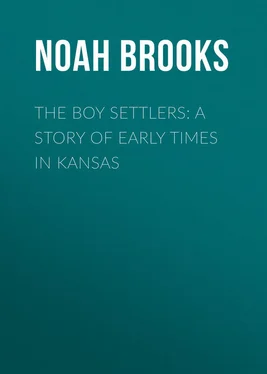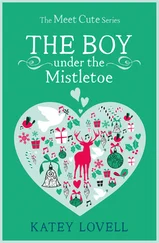Noah Brooks - The Boy Settlers - A Story of Early Times in Kansas
Здесь есть возможность читать онлайн «Noah Brooks - The Boy Settlers - A Story of Early Times in Kansas» — ознакомительный отрывок электронной книги совершенно бесплатно, а после прочтения отрывка купить полную версию. В некоторых случаях можно слушать аудио, скачать через торрент в формате fb2 и присутствует краткое содержание. Жанр: foreign_antique, foreign_prose, foreign_children, на английском языке. Описание произведения, (предисловие) а так же отзывы посетителей доступны на портале библиотеки ЛибКат.
- Название:The Boy Settlers: A Story of Early Times in Kansas
- Автор:
- Жанр:
- Год:неизвестен
- ISBN:нет данных
- Рейтинг книги:5 / 5. Голосов: 1
-
Избранное:Добавить в избранное
- Отзывы:
-
Ваша оценка:
- 100
- 1
- 2
- 3
- 4
- 5
The Boy Settlers: A Story of Early Times in Kansas: краткое содержание, описание и аннотация
Предлагаем к чтению аннотацию, описание, краткое содержание или предисловие (зависит от того, что написал сам автор книги «The Boy Settlers: A Story of Early Times in Kansas»). Если вы не нашли необходимую информацию о книге — напишите в комментариях, мы постараемся отыскать её.
The Boy Settlers: A Story of Early Times in Kansas — читать онлайн ознакомительный отрывок
Ниже представлен текст книги, разбитый по страницам. Система сохранения места последней прочитанной страницы, позволяет с удобством читать онлайн бесплатно книгу «The Boy Settlers: A Story of Early Times in Kansas», без необходимости каждый раз заново искать на чём Вы остановились. Поставьте закладку, и сможете в любой момент перейти на страницу, на которой закончили чтение.
Интервал:
Закладка:
“And now we are about ready to start; only a few more provisions to lay in. Suppose we get away by to-morrow morning?”
“Oh, that’s out of the question, Uncle Aleck,” said Oscar. “What makes you in such a hurry? Why, you have all along said we need not get away from here for a week yet, if we did not want to; the grass hasn’t fairly started yet, and we cannot drive far without feed for the cattle. Four yoke, too,” he added proudly.
“The fact is, Oscar,” said his father, lowering his voice and looking around as if to see whether anybody was within hearing distance, “we have heard this morning that there was a raid on this place threatened from Kansas City, over the border. This is the free-State headquarters in this part of the country, and it has got about that the store here is owned and run by the New England Emigrant Aid Society. So they are threatening to raid the place, burn the settlement, run off the stock, and loot the settlers. I should like to have a company of resolute men to defend the place,” and Mr. Bryant’s eyes flashed; “but this is not our home, nor our fight, and I’m willing to ‘light out’ right off, or as soon as we get ready.”
“Will they come to-night, do you think?” asked Sandy, and his big blue eyes looked very big indeed. “Because we can’t get off until we have loaded the wagon and fixed the wheels; you said they must be greased before we travelled another mile, you know.”
It was agreed, however, that there was no immediate danger of the raid–certainly not that night; but all felt that it was the part of prudence to be ready to start at once; the sooner, the better. When the boys went to their blankets that night, they whispered to each other that the camp might be raided and so they should be ready for any assault that might come. Sandy put his “pepper-box” under his pillow, and Charlie had his trusty rifle within reach. Oscar carried a double-barrelled shot-gun of which he was very proud, and that weapon, loaded with buckshot, was laid carefully by the side of his blankets. The two elders of the party “slept with one eye open,” as they phrased it. But there was no alarm through the night, except once when Mr. Howell got up and went out to see how the cattle were getting on. He found that one of the sentinels who had been set by the Quindaro Company in consequence of the scare, had dropped asleep on the wagon-tongue of the Dixon party. Shaking him gently, he awoke the sleeping sentinel, who at once bawled, “Don’t shoot!” to the great consternation of the nearest campers, who came flying out of their blankets to see what was the matter. When explanations had been made, all laughed, stretched themselves, and then went to bed again to dream of Missouri raiders.
The sun was well up in the sky next day, when the emigrants, having completed their purchases, yoked their oxen and drove up through the settlement and ascended the rolling swale of land that lay beyond the groves skirting the river. Here were camps of other emigrants who had moved out of Quindaro before them, or had come down from the point on the Missouri opposite Parkville, in order to get on to the road that led westward and south of the Kaw. It was a beautifully wooded country. When the lads admired the trees, Mr. Howell somewhat contemptuously said: “Not much good, chiefly black-jacks and scrub-oaks”; but the woods were pleasant to drive through, and when they came upon scattered farms and plantations with comfortable log-cabins set in the midst of cultivated fields, the admiration of the party was excited.
“Only look, Uncle Charlie,” cried Sandy, “there’s a real flower-garden full of hollyhocks and marigolds; and there’s a rose-bush climbing over that log-cabin!” It was too early to distinguish one flower from another by its blooms, but Sandy’s sharp eyes had detected the leaves of the old-fashioned flowers that he loved so well, which he knew were only just planted in the farther northern air of their home in Illinois. It was a pleasant-looking Kansas home, and Sandy wondered how it happened that this cosey living-place had grown up so quickly in this new Territory. It looked as if it were many years old, he said.
“We are still on the Delaware Indian reservation,” replied his uncle. “The Government has given the tribe a big tract of land here and away up to the Kaw. They’ve been here for years, and they are good farmers, I should say, judging from the looks of things hereabouts.”
Just then, as if to explain matters, a decent-looking man, dressed in the rude fashion of the frontier, but in civilized clothes, came out of the cabin, and, pipe in mouth, stared not unkindly at the passing wagon and its party.
“Howdy,” he civilly replied to a friendly greeting from Mr. Howell. The boys knew that “How” was a customary salutation among Indians, but “Howdy” struck them as being comic; Sandy laughed as he turned away his face. Mr. Bryant lingered while the slow-moving oxen plodded their way along the road, and the boys, too, halted to hear what the dark-skinned man had to say. But the Indian–for he was a “civilized” Delaware–was a man of very few words. In answer to Mr. Bryant’s questions, he said he was one of the chiefs of the tribe; he had been to Washington to settle the terms of an agreement with the Government; and he had lived in that cabin six years, and on the present reservation ever since it was established.
All this information came out reluctantly, and with as little use of vital breath as possible. When they had moved on out of earshot, Oscar expressed his decided opinion that that settler was no more like James Fenimore Cooper’s Indians than the lovely Quindaro appeared to be. “Why, did you notice, father,” he continued, “that he actually had on high-heeled boots? Think of that! An Indian with high-heeled boots! Why, in Cooper’s novels they wear moccasins, and some of them go barefoot. These Indians are not worthy of the name.”
“You will see more of the same sort before we get to the river,” said his father. “They have a meeting-house up yonder, by the fork of the road, I am told. And, seeing that this is our first day out of camp on the last stage of our journey, suppose we stop for dinner at Indian John’s, Aleck? It will be a change from camp-fare, and they say that John keeps a good table.”
To the delight of the lads, it was agreed that they should make the halt as suggested, and noon found them at a very large and comfortable “double cabin,” as these peculiar structures are called. Two log-cabins are built, end to end, with one roof covering the two. The passage between them is floored over, and affords an open shelter from rain and sun, and in hot weather is the pleasantest place about the establishment. Indian John’s cabin was built of hewn logs, nicely chinked in with slivers, and daubed with clay to keep out the wintry blasts. As is the manner of the country, one of the cabins was used for the rooms of the family, while the dining-room and kitchen were in the other end of the structure. Indian John regularly furnished dinner to the stage passengers going westward from Quindaro; for a public conveyance, a “mud-wagon,” as it was called, had been put on this part of the road.
“What a tuck-out I had!” said Sandy, after a very bountiful and well-cooked dinner had been disposed of by the party. “And who would have supposed we should ever sit down to an Indian’s table and eat fried chicken, ham and eggs, and corn-dodger, from a regular set of blue-and-white plates, and drink good coffee from crockery cups? It just beats Father Dixon’s Indian stories all to pieces.”
Oscar and Charlie, however, were disposed to think very lightly of this sort of Indian civilization. Oscar said: “If these red men were either one thing or the other, I wouldn’t mind it. But they have shed the gaudy trappings of the wild Indian, and their new clothes do not fit very well. As Grandfather Bryant used to say, they are neither fish nor flesh, nor good red herring. They are a mighty uninteresting lot.”
Читать дальшеИнтервал:
Закладка:
Похожие книги на «The Boy Settlers: A Story of Early Times in Kansas»
Представляем Вашему вниманию похожие книги на «The Boy Settlers: A Story of Early Times in Kansas» списком для выбора. Мы отобрали схожую по названию и смыслу литературу в надежде предоставить читателям больше вариантов отыскать новые, интересные, ещё непрочитанные произведения.
Обсуждение, отзывы о книге «The Boy Settlers: A Story of Early Times in Kansas» и просто собственные мнения читателей. Оставьте ваши комментарии, напишите, что Вы думаете о произведении, его смысле или главных героях. Укажите что конкретно понравилось, а что нет, и почему Вы так считаете.












